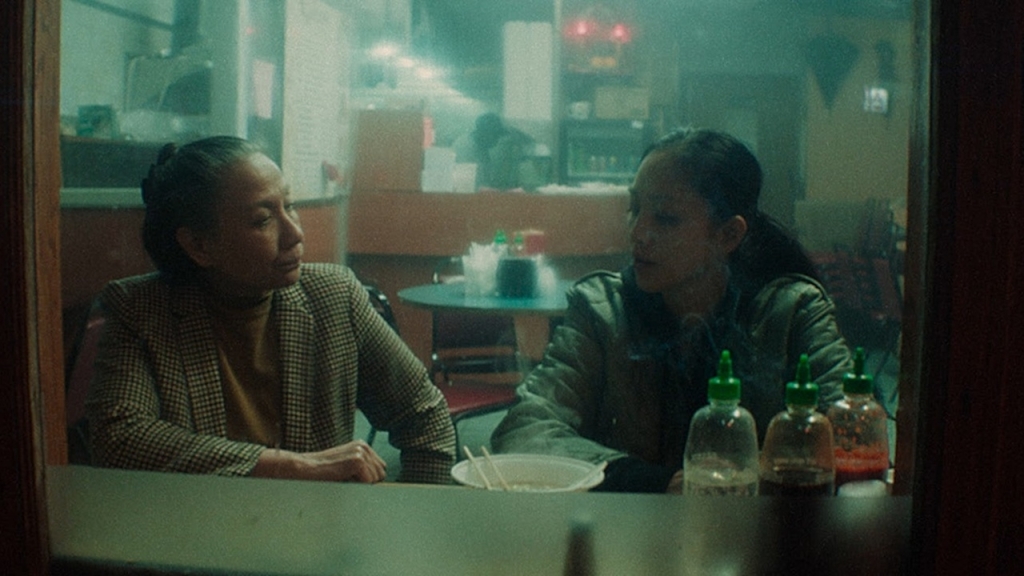By Jana Monji, AsAmNews Arts & Culture Writer
“When drinking water, remember the source,” Sister Tse (Shuya Chang) reminds herself. She’s made a deal–to prostitute herself to repay the $57,000 passage to New York. That’s where she will meet another formidable woman, Dai Mah (Jade Wu).
While this could be the stereotypical East Asian prostitute story, transported from the exotic locales of Asia to New York and filmed to hyper sexualize women of Asian descent, writer/director Evan Jackson Leong carefully focuses on a grittier, darker story. There’s nothing pretty about prostitution or the smuggling of women (and men) in his Snakehead.
Sex isn’t how the film keeps our interest in the saturated, slightly dingy New York that Sister Tse enters. This is a tale of the have-nots, where love may be a luxury.
The introductory titles tell the audience:
Despite the walls of entry, illegal migration thrives. For $50,000, Chinese human smugglers known as Snakeheads provide passage. But today, the strongest pull to come to America is not money.
Lensed by Ray Huang, Snakehead brings together two mothers, both having been separated from a child and making decisions. Played as a quietly calculating but practically dressed woman by Wu (Genghis Connie Lin in Luke Cage and Judge Julie Tanaka in For Life), the older Dai Mah has made her American dream. In New York’s Chinatown, all roads lead to her and she believes she has respect as the murderous boss of various underground activities.

Eight years ago, Sister Tse left her daughter behind (“I didn’t always make the right choice, but I survived”) and her daughter was adopted and taken to New York. Now, while she serves one master, her mother’s desire serves another–searching for her daughter. The love of her daughter is the source of the stream that brings Sister Tse to America.
Sister Tse is clear from the beginning, “I never believed in the American dream; all I knew was how to survive.” Her tale of survival encompasses some decisions that will endanger her daughter and her friends and it’s not always clear who her true allies are. Her tough attitude impresses Dai Mah who tells her, “The past is the past. We make our own fate here.” Dai Mah gives Sister Tse opportunities to pay off her debt in a different way.
For Dai Mah, “There are rules: Chinatown doesn’t change for anyone.” Dai Mah’s black sheep son, Rambo (Sung Kang of Better Luck Tomorrow and the Fast and Furious franchise) has just been let out of prison for killing his father to defend Dai Mah. With a felon in the family, naturally, law enforcement hovers in the background, threatening a gangster lifestyle that is on the verge of collapse. Yet Dai Mah can’t cast him out. She tells Sister Tse: “You know your first-born is always special…I was weak; he was strong. He went to jail when he was 12. Spent more than half his life there. What Rambo is today, I’m to blame….You see your faults in your children.”
According to ShootOnline.com, the film is inspired by the real NYC Sister Ping (Chung Chu Ping–simplified Chinese: 郑翠萍; traditional Chinese: 鄭翠萍;) who was the head of a snakehead (human smuggling) syndicate that brought Chinese immigrants to the US for almost two decades. Sister Ping won’t be complaining about this film; she died in federal prison at 65 in 2014. Her life has already inspired the 2019 Lucky Grandma with Tsai Chin
Leong (credited as Evan Leong for his 2013 documentary Linsanity) was an actor in Justin Lin’s Better Luck Tomorrow, another film that explored the darker side of Asians in the United States. His Snakehead doesn’t exploit the stereotype of dragon ladies, prostitutes and drug dens. Leong’s script and casting suggests the diversity of human smuggling, including Latinos (Omar Angulo) and Africans (Yacine Djoumbaya). He’s telling a particular story centered on two women with dead eyes and fully capable of making harsh and cruel decisions and yet, there’s still something tender underneath it all.
Jade Wu’s Dai Mah speaks fluent, unaccented American English and is in command of her family, Chinatown and some operations outside the city’s borders. Shuya Chang’s Sister Tse is a woman with often vacant eyes whose scar runner deeper than skin and she warns Dai Mah that living is more important than loyalty. That’s until the secret of her daughter is discovered.
Despite the deaths and beat downs in Leong’s Snakehead, this is a film about love and survival and the realization that sometimes these two things are incompatible in a desperate world outside of the model minority template. Snakehead is an Asian American interpretation of reality in a fictionalized world, and Leong’s cinematic voice and vision are well worth seeing. Snakehead premiered at the Santa Barbara International Film Festival in April 2021. It was the opening night presentation for the Asian American International Film Festival in New York on August 11, 2021.
AsAmNews is the proud presenting media sponsor of AAIFF.
AsAmNews has Asian America in its heart. We’re an all-volunteer effort of dedicated staff and interns. Check out our new Instagram account. Go to our Twitter feed and Facebook page for more content. Please consider interning, joining our staff, or submitting a story or making a contribution.

